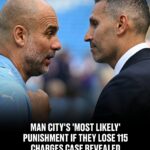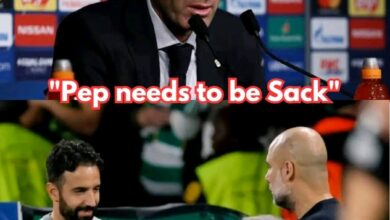Could Man City be stripped of titles? Or have points deducted? Experts give their opinions

As the football world awaits the verdict on Manchester City’s alleged financial rule breaches, speculation is rife about the potential consequences the club could face. With over 100 charges brought by the Premier League, the outcome of this case could have far-reaching implications for one of England’s most successful clubs.
Sky News’ sports correspondent Rob Harris recently spoke with football finance experts at the Financial Times’ Business of Football Summit 2025 to gather their insights on what might happen next. Here’s a breakdown of the key points discussed.
Manchester City is facing approximately 115 charges related to alleged breaches of financial rules. These charges span every season between 2009-10 and 2022-23, a period during which the club won seven Premier League titles, three FA Cups, six League Cups, and a Champions League trophy.
1. Accuracy of Financial Information: Allegations that City provided inaccurate details about sponsorship deals, player payments, and manager remuneration.
2. Breaches of Financial Fair Play (FFP) Rules: Accusations of failing to comply with UEFA’s FFP regulations and the Premier League’s Profit and Sustainability Rules (PSR).
3. Non-Cooperation: Claims that the club failed to cooperate fully with the Premier League’s investigation.
Manchester City has vehemently denied all allegations, stating they welcome the opportunity to present their case to an independent commission.
An independent commission, comprising retired senior judges, has been reviewing the case in private hearings. The commission’s verdict is expected in the coming weeks, and it could range from finding City guilty on all charges to clearing them of any wrongdoing.
If found guilty, the potential punishments could include:
Points Deductions: Similar to Everton and Nottingham Forest, who faced points deductions last season for breaching PSR.
Fines Significant financial penalties for each proven breach.
Title Stripping: The most severe outcome, which could see City stripped of some or all of their titles won during the period in question.
Transfer Bans: Restrictions on signing new players for a specified period.
Relegation: Although unlikely, some have speculated about the possibility of demotion to a lower division.
At the Business of Football Summit, Rob Harris posed key questions to a panel of experts, including Matt Hughes (sports journalist at FootBiz), Simon Leaf (sports lawyer at Mishcon de Reya), and Martin Lipton (chief sports reporter at The Sun). Here’s what they had to say:Simon Leaf described the case as “truly unprecedented in the history of football and financial regulation.” He noted that financial regulation in football is still relatively young, making this case a landmark moment.
Matt Hughes echoed this sentiment, stating that the case represents a culmination of the Premier League’s evolving financial landscape over the past decade.Martin Lipton highlighted the difficulty the Premier League faces in proving the charges. “It’s a huge ask,” he said, emphasizing that the league would need to demonstrate beyond doubt that City knowingly engaged in fraudulent activities.
Many of the charges relate to subjective matters, such as the valuation of sponsorship deals. Unlike Everton’s straightforward overspending case, City’s alleged breaches involve complex financial arrangements that are harder to prove.The experts agreed that the severity of any punishment would depend on the number of charges proven and the nature of the breaches.
Points Deductions: If found guilty of even a few charges, City could face points deductions. However, the panel noted that the Premier League would need to carefully consider the proportionality of such penalties.
Title Stripping: While this remains a possibility, the experts suggested it would be an extreme measure and could set a controversial precedent.
Fines: Financial penalties are seen as the most likely outcome, especially for less severe breaches.The recent cases involving Everton and Nottingham Forest provide some context. Both clubs were docked points for breaching PSR, but their breaches were far less complex than City’s alleged violations.
Simon Leaf pointed out that the independent commission would need to balance the need for a strong deterrent against the potential impact on the club and its fans.
For Manchester City, the stakes could not be higher. A guilty verdict could tarnish the club’s legacy and undermine their recent dominance of English football. However, the club’s strong financial position and legal resources mean they are well-equipped to fight any sanctions.
The case also has broader implications for the Premier League. A harsh punishment could deter other clubs from pushing the boundaries of financial regulations, while a lenient outcome might be seen as a failure to enforce the rules effectively.
As the football world awaits the independent commission’s verdict, the uncertainty surrounding Manchester City’s future continues to grow. While the experts agree that the case is unprecedented in its scale and complexity, they also caution against jumping to conclusions before the full details are revealed.
One thing is clear: the outcome of this case will have a profound impact not only on Manchester City but also on the future of financial regulation in football. Whether it results in points deductions, fines, or even title stripping, the verdict will shape the Premier League’s approach to financial governance for years to come.
For now, all eyes remain on the independent commission as they prepare to deliver their judgment on one of the most significant cases in football history.















